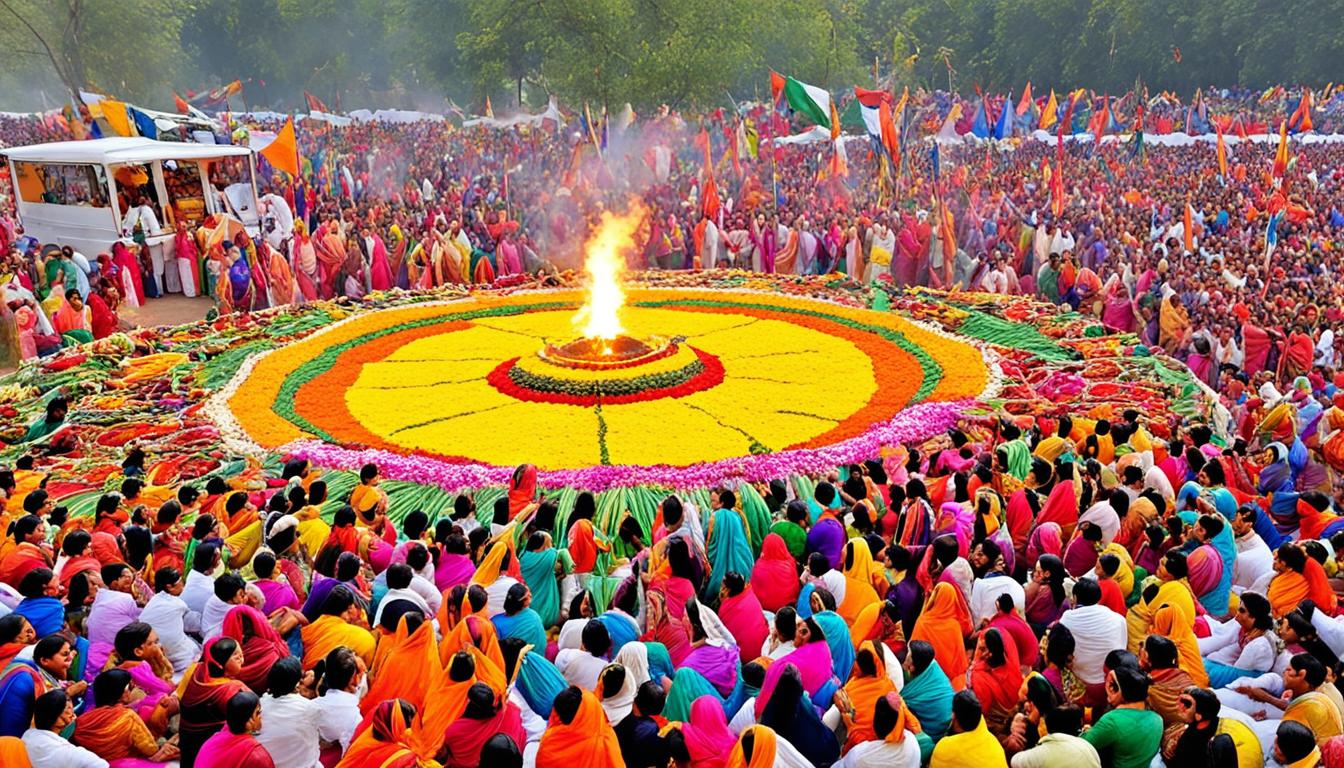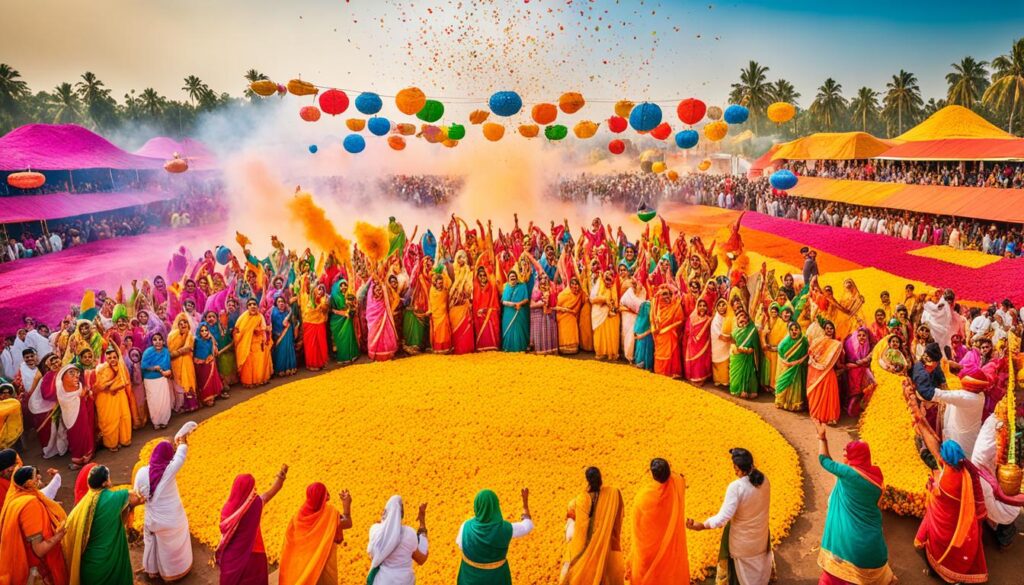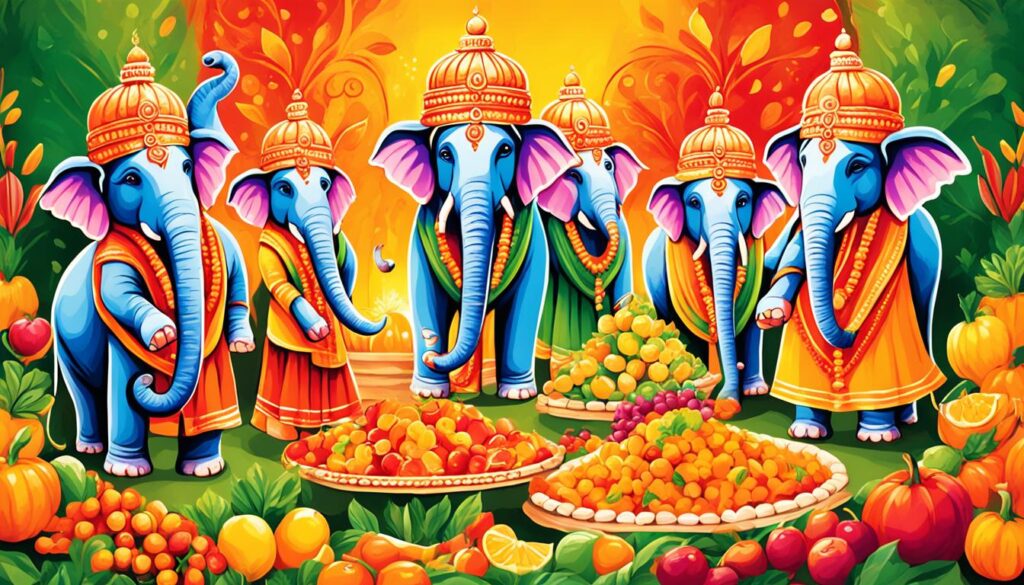
Celebrate the Harvest Festivals of India!
India, known as the “Land of Festivals,” is home to a plethora of vibrant harvest celebrations that showcase the country’s rich cultural heritage. With over 50 harvest festivals celebrated annually, these cultural events hold a significant place in Indian society.
From Pongal in Tamil Nadu to Makar Sankranti in Andhra Pradesh, each festival has its own unique customs, traditions, and regional flavors. These harvest festivals bring people together, fostering a sense of community and gratitude for the abundance of the harvest season.
If you’re intrigued by the splendor and diversity of Indian harvest celebrations, join us as we delve into the colorful world of harvest festivals in India and explore the traditions, significance, and cultural tapestry that make these festivals truly unforgettable.
What is a Harvest Festival?
A harvest festival in India is a joyous celebration that marks the culmination of the growing season and the gathering of crops. These festivals typically take place in the autumn, around the time of the harvest. They hold great cultural, social, and religious significance, providing an opportunity for people to express gratitude for a successful harvest and to celebrate the abundance of the season.
Harvest festivals in India are characterized by various rituals, ceremonies, and festivities. They bring communities together in a spirit of unity and togetherness, strengthening bonds and fostering a sense of belonging. These celebrations serve as a time for reflection and appreciation, honoring the hard work of farmers and acknowledging the importance of nature’s bounty.
“A good harvest is not only a result of hard work, but also a gift from nature. Harvest festivals allow us to pay tribute to both.”
During harvest festivals, people partake in religious ceremonies and offer prayers for a bountiful season ahead. They prepare elaborate feasts with traditional dishes made from freshly harvested crops, symbolizing the abundance and prosperity of the harvest. Festivities often involve vibrant music, dance performances, and colorful decorations, creating a festive atmosphere that permeates entire communities.
Harvest festivals in India not only celebrate the harvest itself but also tradition and cultural heritage. They provide an opportunity to pass on age-old customs and values from one generation to the next, ensuring they are preserved and cherished. These festivals are an integral part of the Indian cultural tapestry, embodying the spirit of gratitude, unity, and shared prosperity.
Significance of Harvest Festivals
The significance of harvest festivals in India extends beyond the mere celebration of a successful harvest. These festivals hold deep-rooted cultural and religious importance, embodying the values and beliefs of the people. Some of the key significance of harvest festivals includes:
- Expressing gratitude for the abundance of the harvest and the blessings of nature
- Celebrating and preserving the cultural heritage of a region
- Promoting unity and togetherness within communities
- Recognizing the efforts of farmers and their contribution to society
- Reinforcing the cycle of life and the interconnectedness of humans with nature
Through these festivals, people reflect on the importance of agriculture and its impact on their lives. They honor the cycle of sowing, nurturing, and reaping, symbolizing the larger cycles of life and the interconnectedness of all living beings. Harvest festivals serve as a reminder of the abundance that nature provides and the need to protect and sustain the environment for future generations.
Different Types of Harvest Festivals in India
India’s diverse culture and traditions give rise to a multitude of harvest festivals celebrated across the country. Each festival showcases the unique customs, rituals, and traditional dishes associated with it, reflecting the rich agricultural heritage of the region. Let’s explore some of the most well-known harvest festivals in India:
Pongal Festival
The Pongal festival is celebrated in Tamil Nadu to mark the prosperous harvest of the winter crops. It is a four-day festival dedicated to the Sun God and involves the preparation of a special dish called Pongal, made with freshly harvested rice. The festival also includes vibrant decorations, traditional dances, and bull-taming events known as Jallikattu.
Makar Sankranti
Makar Sankranti is celebrated in Andhra Pradesh and Telangana to honor the Sun God and mark the transition of the Sun into the zodiac sign of Capricorn. The festival is known for its kite flying competitions, bonfires, and the exchange of Tilgul (a sweet made from sesame and jaggery) to spread joy and harmony.
Lohri Festival
Lohri is predominantly celebrated in Punjab to symbolize the end of the winter solstice. The festival is characterized by massive bonfires, traditional folk dances like Bhangra and Giddha, and the singing of traditional songs that depict the triumph of good over evil. People offer prayers, exchange sweets, and gather with friends and family to celebrate the harvest season.
Bhogali Bihu
Bhogali Bihu, also known as Magh Bihu, is celebrated in Assam to mark the end of the harvesting season. The festival is known for community feasts, called Bhogali Bihu, where people come together to enjoy traditional Assamese delicacies like rice cakes, meat, and sweets. It also involves traditional sports, music, and dance performances.
| Festival | State | Significance |
|---|---|---|
| Pongal | Tamil Nadu | Marking the winter harvest and thanking the Sun God |
| Makar Sankranti | Andhra Pradesh and Telangana | Symbolizing the transition of the Sun into Capricorn |
| Lohri | Punjab | Celebrating the end of winter solstice and the harvest season |
| Bhogali Bihu | Assam | Marking the end of the harvesting season with feasts and festivities |
Harvest Festivals in Different States of India
India’s rich cultural diversity is evident in the various harvest festivals celebrated across its states. Each state has its own unique traditions, rituals, and festivities that make their harvest celebrations special. Let’s take a closer look at some of the notable harvest festivals celebrated in different states of India:
Punjab – Lohri
Lohri is a vibrant harvest festival celebrated with great enthusiasm in the state of Punjab. It marks the end of winter and the onset of longer days. People gather around bonfires, sing traditional songs, perform folk dances like Bhangra and Giddha, and offer prayers for a bountiful harvest. The festival is incomplete without indulging in delicious traditional dishes like Makki ki Roti (cornbread) and Sarson da Saag (mustard greens).
Maharashtra, Gujarat, and Tamil Nadu – Makar Sankranti/Pongal
Makar Sankranti, also known as Pongal in Tamil Nadu, is celebrated with great fervor in multiple states of India. This harvest festival is marked by the exchange of sweets made from jaggery and sesame seeds, symbolizing the sweetness and prosperity of the harvest season. People decorate their homes with colorful rangoli designs, fly kites, and participate in cultural events to celebrate the occasion.
Assam – Bihu
Bihu is a traditional harvest festival celebrated with immense joy in Assam. The festival encompasses three different forms of Bihu – Rongali Bihu (spring festival), Kongali Bihu (autumn festival), and Bhogali Bihu (harvest festival). During Bhogali Bihu, people build makeshift huts called “Bhelaghars” in the fields and feast on traditional Assamese delicacies like Pitha (rice cakes), Laru (sweet sesame balls), and various meat preparations.
Kerala – Onam
Onam, the state festival of Kerala, is a grand harvest festival celebrating the golden age of King Mahabali. The highlight of the festival is the elaborate floral carpet known as Pookalam, made with vibrant flowers arranged in beautiful patterns. People participate in boat races, traditional dances like Kaikottikali, and sumptuous feasts called Onasadya, consisting of numerous vegetarian dishes served on a banana leaf.
| State | Harvest Festival | Significance |
|---|---|---|
| Punjab | Lohri | Celebrates the end of winter and the beginning of longer days |
| Maharashtra, Gujarat, Tamil Nadu | Makar Sankranti/Pongal | Marking the transition of the sun into the zodiac sign of Capricorn, signifying longer days and a new harvest season |
| Assam | Bihu | Celebrates the arrival of spring and the harvest season with music, dance, and feasts |
| Kerala | Onam | Commemorates the golden age of King Mahabali and offers gratitude for a bountiful harvest |
The above festivals are just a glimpse of the diverse harvest celebrations that take place across India. Each state’s unique customs, rituals, and regional cuisines make these festivals an integral part of India’s cultural tapestry. These harvest festivals not only celebrate the abundance of nature but also strengthen the bond between communities and showcase the rich traditions of the country.

Key Facts about Indian Harvest Festivals
Indian harvest festivals are deeply rooted in ancient traditions and are renowned for their vibrant and joyous celebrations. These festivals hold immense cultural and spiritual significance, reflecting the gratitude and reverence for the bountiful harvests. Here are some key facts about Indian harvest festivals:
- Expressing Gratitude: Harvest festivals in India are a time for people to express gratitude for the abundant harvest and the blessing of nature’s bounty.
- Celebrating Community: These festivals bring communities together, fostering a sense of togetherness and unity as people rejoice in their shared agricultural heritage.
- Cultural Bonding: Harvest festivals provide a platform for preserving and honoring cultural traditions, customs, and practices that are passed down from generation to generation.
- Religious and Spiritual Origins: Many harvest festivals have religious and spiritual origins, intertwining the celebration of nature’s abundance with devotion and rituals.
- Representation of Life’s Cycle: Indian harvest festivals symbolize the cyclical nature of life, reminding people of the interconnectedness of seasons, agriculture, and human existence.
- Sharing Resources: These festivals emphasize the importance of sharing resources and promoting equity, especially during times of scarcity and hardship.
Indian harvest festivals are a testament to the rich cultural tapestry of the country and its enduring agricultural heritage. They serve as a reminder to cherish the gifts of nature, strengthen community bonds, and celebrate the abundance of life.

Conclusion
Harvest festivals in India showcase the country’s rich cultural heritage and traditions, providing a platform to honor the hard work of farmers, express gratitude for the abundant harvest, and strengthen community bonds. These festivals are a testament to the diversity and variety found in different regions, with each celebrating the harvest season in their unique ways.
From the lively Pongal in Tamil Nadu to the grand celebrations of Onam in Kerala, Indian harvest festivals bring to life the vibrant spirit and joyous celebrations that mark this auspicious time. These festivals serve as a reminder of the agricultural roots of the nation, highlighting the importance of farming and the reliance on the land for sustenance.
Through centuries-old customs and rituals, harvest festivals in India offer an opportunity for people to come together and appreciate the abundance of nature. The shared feasts, religious ceremonies, and traditional dances create an atmosphere of unity and collective gratitude.
Source Links
- https://www.geeksforgeeks.org/harvest-festivals-of-india/
- https://www.clearias.com/harvest-festivals-in-india/
- https://byjus.com/current-affairs/harvest-festivals-of-india/

Leave a Reply